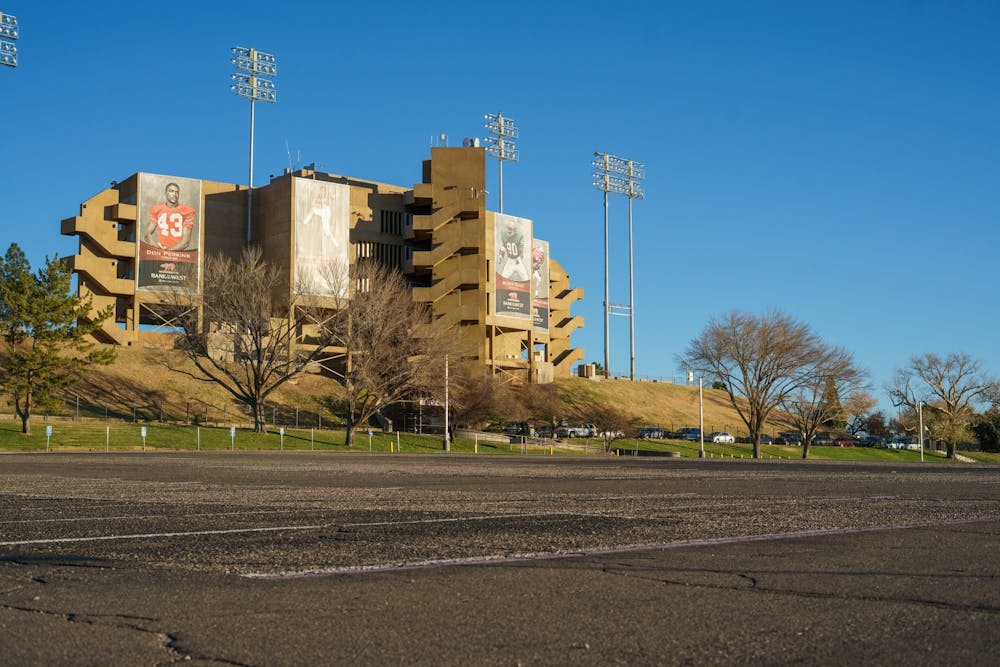In a move costing the University of New Mexico an additional $70,000 a week in Athletics department costs, the relocation of the 1-5 Lobo football team to Las Vegas, Nevada, is slated to increase its already-multimillion dollar deficit.
Athletics director Eddie Nuñez told the Daily Lobo in a phone interview that the cost of housing the football team out of state will likely result in the department outspending its budget for the 2020-21 fiscal year.
“At this point, if you’re asking me today and the challenges we have faced — with not being able to have fans in the stands, and COVID affecting the revenue — I would anticipate a deficit this upcoming year,” Nuñez said.
In recent Student Fee Review Board (SFRB) deliberations for the 2021-22 fiscal year, the Athletics department requested $3,571,257 dollars, with board members recommending a $3,471,257 student fee allocation to the department.
To receive funding each year from the SFRB, Athletics must submit an application and make a presentation about how it plans to spend its yearly budget.
UNM political science major and senior Emma Hotz, who served as a member on this year’s Student Fee Review Board, said the Athletics department was unclear about where its share of student fees were to be spent.
“They only have three line items in their request, and they are really, really broad,” Hotz said. “And I think in general they get away with this because they claim that they have such a large budget they are working with. Which is fair — because they are working with a lot more money than other centers — but I don’t think that is an excuse.”
The planned expenditure for the Athletics department for the 2020-21 fiscal year (ending June 30, 2021) is $32,706,467, or 3.6% of the total budget for the University. The deficit facing Athletics at the end of the 2019-20 fiscal year was close to $4.5 million, according to budget documents.
“Every penny we get from the University, the state, the student fees, really goes back to the student athletes,” Nuñez said. “It doesn’t go back to the salaries, or the coaches.”
Nuñez’s base salary is $300,000 a year. His five-year contract ends in 2022.
Hotz said Nuñez’s comment was “not a lie, but an extreme. What exactly are you giving them that’s going back to them? … (This is) not false, but a stretch.”
During final deliberations at the SFRB meeting for the next fiscal year, there was confusion among board members regarding the football team’s excessive spending on private tutoring — nearly $50,000 worth — instead of using CAPS, UNM’s on-campus, tutoring service that is available to all students. SFRB members were also struck by the Athletics department spending student fees on fast food meals for away games.
Get content from The Daily Lobo delivered to your inbox
“If (the student athletes) are getting free Chipotle, is that really the best use of their money?” Hotz said.
When asked how long it would take the department to recover from its deficit, Nuñez said, “To sit here and say I know that number now would not be honest.”
UNM Regent Robert Schwartz has been outspoken about his concerns regarding the sustainability of the football program.
“I think this issue is going to keep on coming back, and we are either going to have to cut the athletic budget at least to some extent or we are going to cut the academic budget, because there are not enough resources to cover everything across the board,” Schwartz said.
Some graduate students on campus also expressed their frustrations with the Athletics department’s massive budget amidst their long struggle to unionize in attempts to secure sufficient wages.
“I think the issue is that we don’t have a say — we don’t have a say in the decision and how much Athletics is getting as opposed to other parts of campus,” Axel Gonzalez, a Ph.D. candidate in the American Studies department, said. “The University should be prioritizing the needs of its workers and students.”
Though moving the football team out of state comes with a hefty price tag, student athletes argue it’s worth it because it gives them an opportunity to bond, practice and play.
“Moving away was the price we had to pay in order to play the game we love,” Troy Sicaeros, the football team’s long snapper, said. “I’ve just been trying to take advantage of living with the team and see it as more of an opportunity rather than a burden. It’s a great opportunity for us to come closer and get to know each other a bit better, build some more trust.”
Schwartz suggested cutting NCAA football and converting the program into a club team, which would eliminate the costs of scholarships and expensive coaching while still allowing the team to continue to operate in a far less expensive capacity.
Schwartz said this would be “the best compromise for UNM that allows us to participate appropriately in intercollegiate sports in a way that doesn’t cost us nearly as much as what we are paying now.”
Nuñez was asked for comment on what other savings strategies the team has been taking to diminish the deficit but didn’t respond before the publication of this article.
Madeline Pukite is a freelance reporter at the Daily Lobo. She can be contacted at news@dailylobo.com or on Twitter @madelinepukite






